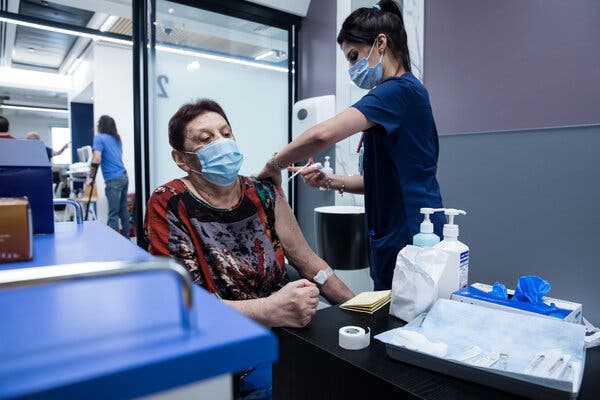Advertisement
Supported by
Israeli Data Suggests Possible Waning in Effectiveness of Pfizer Vaccine
The new numbers still show overwhelmingly strong protection against severe disease but diminished effectiveness against infection.

As Israel struggles with a new surge of coronavirus cases, its health ministry reported on Thursday that although effectiveness of the Pfizer-BioNTech vaccine remains high against severe illness, its protection against infection by the coronavirus may have diminished significantly compared with this winter and early spring.
Analyzing the government’s national health statistics, researchers estimated that the Pfizer shot was just 39 percent effective against preventing infection in the country in late June and early July, compared with 95 percent from January to early April. In both time periods, however, the shot was more than 90 percent effective in preventing severe disease.
Israeli scientists cautioned that the new study is much smaller than the first and that it measured cases in a narrower window of time. As a result, a much larger range of uncertainties flank their estimates, which could also be skewed by a variety of other factors.
Dr. Ran Balicer, the chairman of Israel’s Covid-19 National Expert Advisory Panel, said that the challenges of making accurate estimates of vaccine effectiveness were “immense.” He said that more careful analysis of the raw data was needed to understand what is going on.
“I think that data should be taken very cautiously because of small numbers,” said Eran Segal, a biologist at the Weizmann Institute of Science who is a consultant to the Israeli government on vaccines.
Nevertheless, the new estimates are raising concern both in Israel and elsewhere, including the United States, that the vaccine might be losing some of its effectiveness. Possible reasons include the rise of the highly contagious Delta variant or a waning of protection from the shots over time.
Israel launched an aggressive campaign with the Pfizer vaccine in January, and the country has achieved one of the highest vaccination rates in the world, with 58 percent of the population fully vaccinated. At the start of the campaign, government researchers began estimating how much the shot reduced people’s risk of getting Covid-19.
They published their results in May, based on records from Jan. 24 to April 3: They estimated that the vaccine was 95 percent effective in preventing infection from the coronavirus in the country. In other words, the risk of getting Covid-19 was nearly 100 percent reduced in vaccinated people compared to unvaccinated ones. The researchers also estimated that the vaccine was 97.5 percent effective against severe disease.
From a peak of over 8,600 cases a day in January, cases plummeted in the following months until only a few dozen people were testing positive on a daily basis across Israel. The vaccine most likely played a part in that drop, along with the tight restrictions that the government imposed on travel and meetings.
Israel began relaxing its restrictions in the spring. In late June, the cases surged again. Now, over a thousand people are testing positive each day, leading Israel to restore some restrictions this week.
Some of the people that tested positive for the coronavirus in the new surge were fully vaccinated. Epidemiologists had expected such breakthrough infections, as they do with all vaccines.
Researchers at the Ministry of Health took another look at the effectiveness of the vaccine, limiting their analysis to the surge from June 6 to July 3. In that period, they estimated, the effectiveness of the vaccine at preventing infections was down to 64 percent.
More recently, they ran another analysis. This time, they looked at cases between June 20 and July 17. In that period, they estimated, the vaccine’s effectiveness was even lower: just 39 percent against infection.
Still, they estimated that the vaccine’s effectiveness against serious disease remained high, at 91.4 percent.
If a vaccine has an effectiveness of 39 percent that does not mean that 61 percent of people who got vaccinated were infected by the coronavirus. Instead, it means the risk of getting infected is 39 percent less among vaccinated people compared to unvaccinated. So even at that lower percentage, the data shows that vaccinated people have significantly less risk of getting infected than unvaccinated people.
The small number of people in the latest study means that the true effectiveness might be lower or higher. Making the numbers even more uncertain is the fact that the new surge has not yet spread evenly across the whole country. Travelers who have picked up the highly contagious Delta variant have brought it back to neighborhoods where vaccination rates are relatively high.
Understand the State of Vaccine Mandates in the U.S.
- College and universities. More than 400 colleges and universities are requiring students to be vaccinated for Covid-19. Almost all are in states that voted for President Biden.
- Hospitals and medical centers. Many hospitals and major health systems are requiring employees to get the Covid-19 vaccine, citing rising caseloads fueled by the Delta variant and stubbornly low vaccination rates in their communities, even within their work force. In N.Y.C., workers in city-run hospitals and health clinics will be required to get vaccinated or else get tested on a weekly basis.
- Can your employer require a vaccine? Companies can require workers entering the workplace to be vaccinated against the coronavirus, according to recent U.S. government guidance.
The new outbreaks have yet to swamp communities of Orthodox Jews or Arab Israelis, where vaccination rates are lower. That imbalance may make the vaccine seem less effective than it really is.
Also, the ages of people vaccinated vary significantly during the different time periods studied. For example, the people who got their vaccines in January were different than those who got them in April in one major respect: They were over 60. If more people who got vaccinated in January are now getting infected, it may not have to do with the vaccine itself, but with their advanced age — or some other factor that researchers have yet to take into consideration.
Still, the new estimates have prompted some researchers to ponder what might be happening to the vaccines. The Delta variant grew more common in Israel in June, raising the possibility that it might be good at evading the vaccine.
In Britain, where Delta began surging earlier in the year, researchers estimated the effectiveness of the Pfizer-BioNTech vaccine against the variant, based on a review of everyone in the United Kingdom who got vaccinated up till May 16. On Wednesday, they reported in the New England Journal of Medicine that it is 88 percent effective against symptomatic Covid-19.
Another possibility is that the Pfizer-BioNTech vaccine is gradually becoming less potent. The Ministry of Health researchers found that people who were inoculated in January were having breakthrough infections at a greater rate than people vaccinated in April.
If the vaccine is indeed waning after six months, the implications can be enormous. It can influence the Israeli government’s current deliberations about whether to give people a third shot. Dr. Segal says that if the vaccines are indeed losing some of their potency, then it might be wise to roll out boosters to fight the Delta-driven outbreak.
“If a third booster is safe and if it seems that it really would give a benefit, I think this is something we should definitely do as quickly as possible,” he said.
Dr. Balicer, who is also the chief innovation officer at Clalit Health Services, said that he and his colleagues are working on their own study on the effectiveness of the vaccine in Israel, using Clalit’s health care records to take into account such confounding factors.
“I think there is definitely some waning, but not as much as hypothesized based on the crude data, and it’s not just waning to blame,” Dr. Balicer said. “We are now trying to figure it out in a clean way.”
Advertisement

